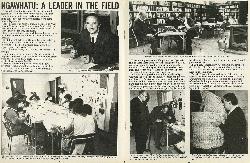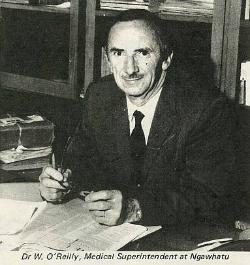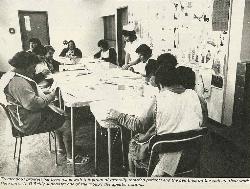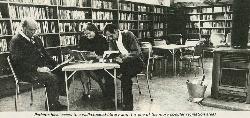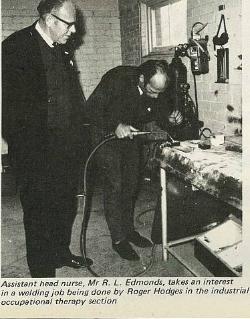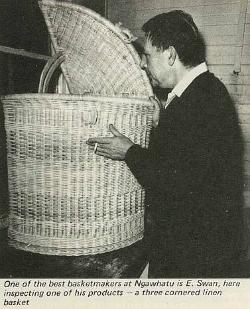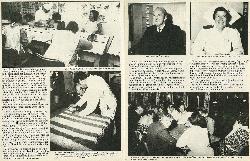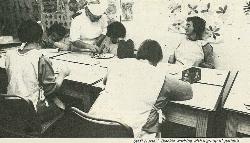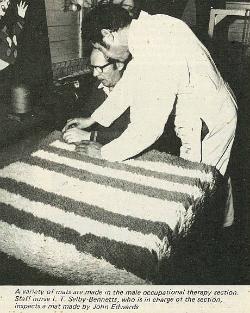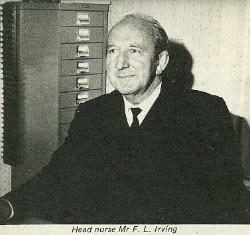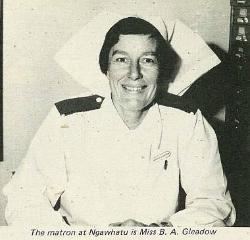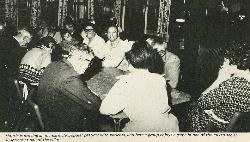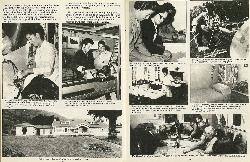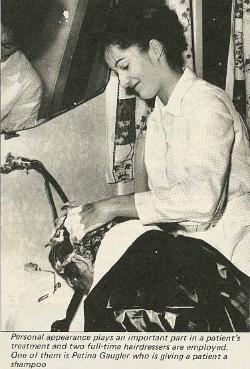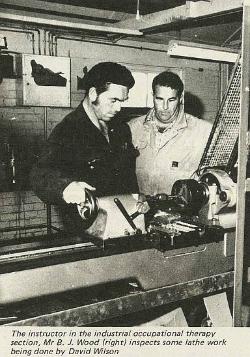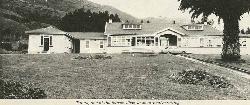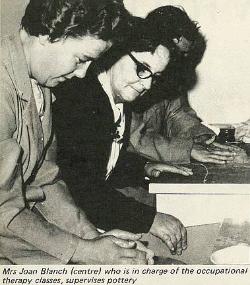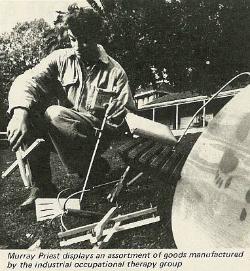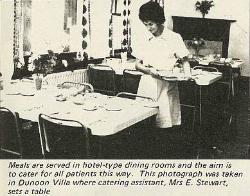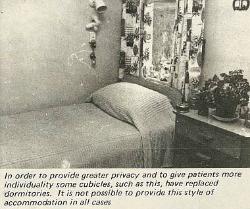34
Ngawhatu: A Leader in the Field
Ngawhatu Hospital is leading the way in several aspects of treatment for the mentally ill. This may come as a surprise to many Nelsonians who are quite content to ignore the wonderful work being done at Ngawhatu.
Indeed those who refer to mental hospitals as "mad houses, " "looney bins, " "nut houses, " and think the patients are locked in "padded cells" or subdued in "strait jackets" are way off beam.
This is an enlightened age with tremendous advances in all medical fields including treatment of mental illnesses.
Mental hospitals have in the past been shrouded by mystery and, as with most things of which little is known, there has been a stigma attached to being treated in such an institution.
But, like the man says in the song, "the times are achangin'."
People are recognising mental disturbances for what they are - diseases which can be treated and, in many cases, cured. True, there is still a social stigma but this has lessened considerably.
"People are becoming more aware of mental disturbances and are not afraid to notify us if they notice these traits in relatives, " said the matron at Ngawhatu, Miss B. A. Gleadow.
35
There are approximately 650 patients at Ngawhatu and of these there are more of the long stay type who are in the main the psycho-geriatric and mentally deficient. The other type, the acutes, receive treatment and return home. More of the latter type are seeking earlier treatment than previously.
A dominant impression created by a visit to Ngawhatu is the tremendous amount of freedom patients are allowed. This is a current trend in all psychiatric hospitals and progressively over the years more doors have been unlocked, more freedom given the patients.
Patients who once would have had knives and forks locked away from them are now operating lathes and bench saws. Shuttered windows are no longer there to greet the visitor.
If you hear someone say "Locked up at Ngawhatu" don't believe it. There is a marked absence of locks and to most patients Ngawhatu is home. They don't have to be locked up.
We said Ngawhatu was leading the field in several aspects. Some of them include an in-service training programme for trained staff, to keep them abreast of modern technique; an orientation programme for new staff and also for any staff who leave and return. This is to give staff an insight into the sections and layout of Ngawhatu.
Patients have access to a well-stocked library and it is one of the more popular recreation areas
Assistant head nurse, Mr R. L. Edmonds, takes an interest in a welding job being done by Roger Hodges in the industrial occupational therapy section
One of the best basketmakers at Ngawhatu is E. Swan, here inspecting one of his products - a three cornered linen basket
36
Another innovation was a combined preliminary training programme for Ngawhatu and Nelson Hospital nurses, using the same team of tutors. This started last year. Previously each hospital had its own training programme. Ngawhatu is one of the few hospitals in New Zealand which allows its epileptic patients to swim. In all cases they are accompanied by nurses who are strong swimmers and there have been no incidents.
Bus trips have long been part of treatment at Ngawhatu and, unlike many other hospitals which allows bus trips to only fairly deserted places, Ngawhatu puts the accent on visits to areas where there are other people. So it is not unusual to see Ngawhatu patients at the beach, picnic areas and at sports meetings.
There are numerous occupational therapy groups and indeed a deal of money for the hospital's recreation fund is earned by patients in the industrial occupational therapy section. This group undertakes various work on contract. The patients are paid, with the surplus going to the recreation fund. Pottery, art, basketmaking, sewing, dressmaking and soft toy manufacturing are some of the many activities undertaken in treatment. An emphasis is placed on integrated activities and various forms of social functions are held. A glance through a Weekly Recreation Programme reveals some of them: card evenings, badminton, films, folk dancing and socials in the villas.
Each villa stages a social function and this may include playing cards or housie, which is becoming increasingly popular. Every effort is made to keep patients mentally stimulated and to participate fully in activities.
37
Careful attention is also paid to the personal appearance of patients and in keeping with this policy two full-time hairdressers are employed.
"One of the first things mentally depressed people let go is their appearance, " said Miss Gleadow. "This in turn aggravates the situation because the person is affected by the sight of herself."
One group of patients which has shown tremendous improvement in the last 15 months is that comprising about 22 mentally retarded patients. At one stage, members of this group could not recognise space, i.e. shapes, circles and squares. Their discipline was limited and their behaviour asocial.
"They are being assisted to cope with everyday living, " said Miss Gleadow. "We are leading towards a more normal life, giving them a sense of belonging to a real world. In general, their attention and application has improved. They complete projects of painting and drawing to the best of their ability. Class discipline has reduced the old habit of shouting and screaming when they want objects."
A lot is being done for these patients but more can be done. The main problem is lack of staff.
Ngawhatu's establishment was once sufficient but now that more specialised treatment is being given, this establishment is not enough.
38
Patients who show improvement are given the chance to see if they can cope with outside living and hold down an eight-hour job. They are put on work trial. Initially they live at Ngawhatu and travel from there every day to their jobs. This continues for three months and if the arrangement proves satisfactory they can leave the hospital, find board and continue their job.
Some long term patients also undertake seasonal work and during fruit picking many get jobs around Nelson in the orchards.
We hope this article and the accompanying photographs have given the public an insight into the work at Ngawhatu and we would like to thank the staff at the hospital for the outstanding co-operation we received during its compilation. - Editor.
Personal appearance plays an important part in a patient's treatment and two full-time hairdressers are employed. One of them is Petina Gaugler who is giving a patient a shampoo
The instructor in the industrial occupational therapy section, Mr B. J. Wood (right) inspects some lathe work being done by David Wilson
Totara, one of the female villas, in an attractive setting
39
Mrs Joan Blanch (centre) who is in charge of the occupational therapy classes, supervises pottery
Murray Priest displays an assortment of goods manufactured by the industrial occupational therapy group
Meals are served in hotel-type dining rooms and the aim is to cater for all patients this way. This photograph was taken in Dunoon Villa where catering assistant, Mrs E. Stewart, sets a table
In order to provide greater privacy and to give patients more individuality some cubicles, such as this, have replaced dormitories. It is not possible to provide this style of accommodation in all cases
Mrs Marple's art class is popular with both men and women and is an important section of treatment. Mrs Marple is standing


